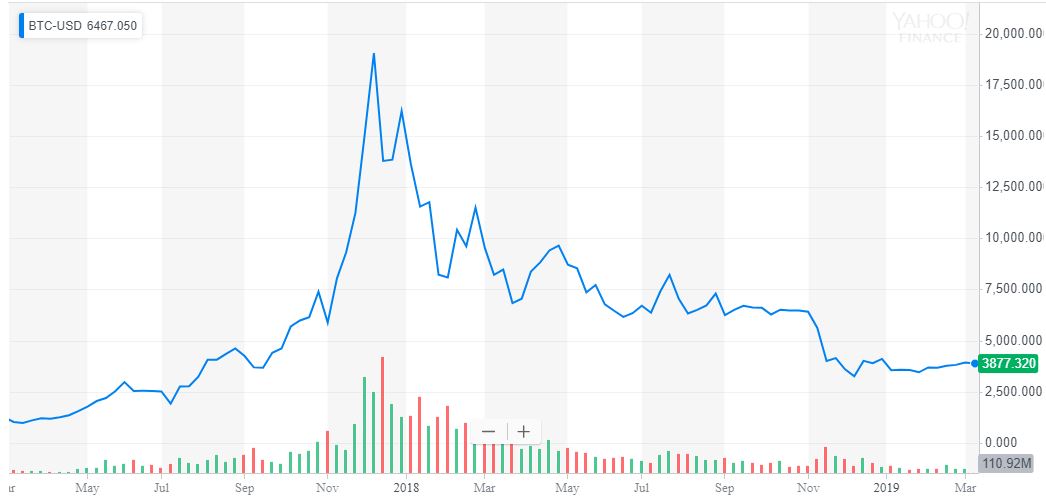Bitcoin Would Survive Recession, But Ethereum Might Crater: Tech VC

One tech VC said that bitcoin has the fortitude to withstand a recession, though the same might not be true of ethereum. | Source: Shutterstock
Bitcoin would survive a recession, while Ethereum would suffer and Ripple’s XRP would remain unaffected. That’s the prediction of Kyle Chapman, a partner with tech venture capital firm Cosimo Ventures.
Chapman wrote in Barron’s that a recession would not hurt bitcoin because it’s decentralized and is mostly independent of the stock market’s cyclical undulations.
Fed Chair: Relax, No Recession In 2019
Meanwhile, Federal Reserve chairman Jerome Powell does not believe a U.S. recession will happen anytime soon. Other economists, like Allianz’s Mohamed El-Erian, agree.
“The outlook for our economy is a favorable one,” Powell told 60 Minutes on March 10. “It’s a positive one.”
“I think growth this year will be slower than last year. Last year was the highest growth that we’ve experienced since the financial crisis, really in more than 10 years. This year, I expect that growth will continue to be positive and continue to be at a healthy rate.”
Chapman: Bitcoin May Become a Safe Haven Like Gold
As for the cryptocurrency market, Cosimo Ventures’ Kyle Chapman says bitcoin would probably become a safe-haven asset, and its price would spike during an economic downturn.
“Faced with a recession, Bitcoin may serve a market function similar to that of a safe-haven commodity, rather than an equity, due to its inherent scarcity and decentrality.
“Bitcoin, by design, is not intended to be used as a foundation on which developers could build a platform or enterprise.
“Because its supply is not controlled by any one person or entity, it’s more likely that Bitcoin will perform independently of broad market pressures (akin to how one would expect gold to react) — potentially even appreciating in value should demand for alternative forms of dependable value storage arise.”
Ethereum Follows Stock Market Trends

In contrast, Chapman expects Ethereum to underperform during a recession because it’s more closely entangled with the equity markets than other cryptocurrencies. Accordingly, Ethereum’s trajectory generally follows broader stock-market trends.
“Because Ethereum is a developer-focused blockchain, it’s very much dependent on how many companies use the Ethereum platform to build their projects. If those companies were to go out of business, Ethereum’s relevance and, subsequently, its price, would undoubtedly be affected.”
As for Ripple’s XRP, Kyle Chapman believes it would remain largely unaffected by a recession because it functions more as a medium of exchange that operates independently of the stock market.
“Because XRP functions outside the purview of mainstream markets, it’s certainly reasonable to believe that XRP would act independently in the event of a recession.”
“On the other hand, however, XRP’s price is also highly dependent on issuance and adoption. If Ripple loses usership — either because its issuance was mismanaged or because other projects (such as J.P. Morgan’s JPM Coin) became more popular — XRP’s value would almost surely go with it.”
Chapman: Crypto Market is Due for Recession

Chapman says he’s uncertain if a recession is around the corner. However, he believes the digital asset industry is overdue for one. (Some would argue that we’re already in a crypto recession.)
And if this happens, Chapman says it’s good news for the industry. Why? Because disruptive market downturns separate the wheat from the chaff.
In other words, a market crash will ensure that only the strong survive, and that worthless cryptocurrencies will be eliminated. And that’s better for everyone in the long run, he says.
Reddit Founder: Crypto Winter Is Good for the Market
While many crypto fans are wringing their hands over crashing bitcoin prices, some notable investors say the protracted bear market is fantastic for the industry.
Take Reddit co-founder Alexis Ohanian, an early investor in crypto exchange Coinbase. Ohanian says the harsh Crypto Winter is great for the long-term health of the industry.
Ohanian says the market crash chased away the flaky, fair-weather investors, and left behind the true enthusiasts.
“This is the Crypto Winter, no doubt. Yes, the prices are depressed. The speculators have fled, and that’s great.”
“Because the people who are now building on crypto are true believers. They’re actually building the infrastructure that it’s going to take to really make this happen.”
“The hype is gone. The fervor is gone. That’s a good thing for all of us who have been in this [from the beginning].”